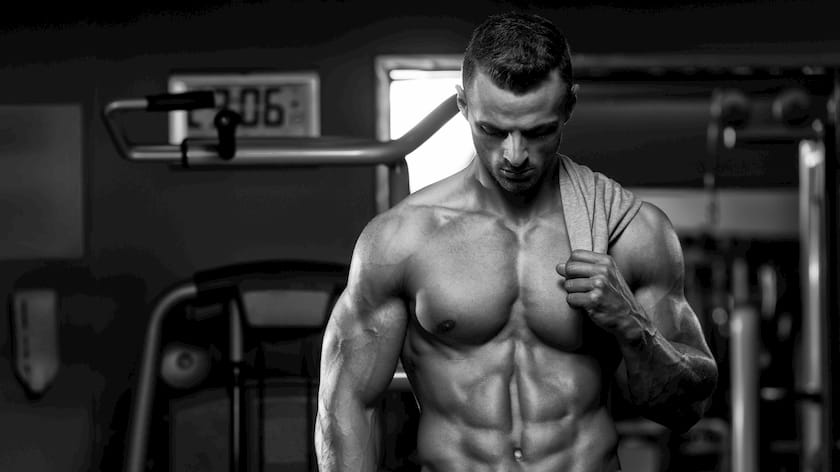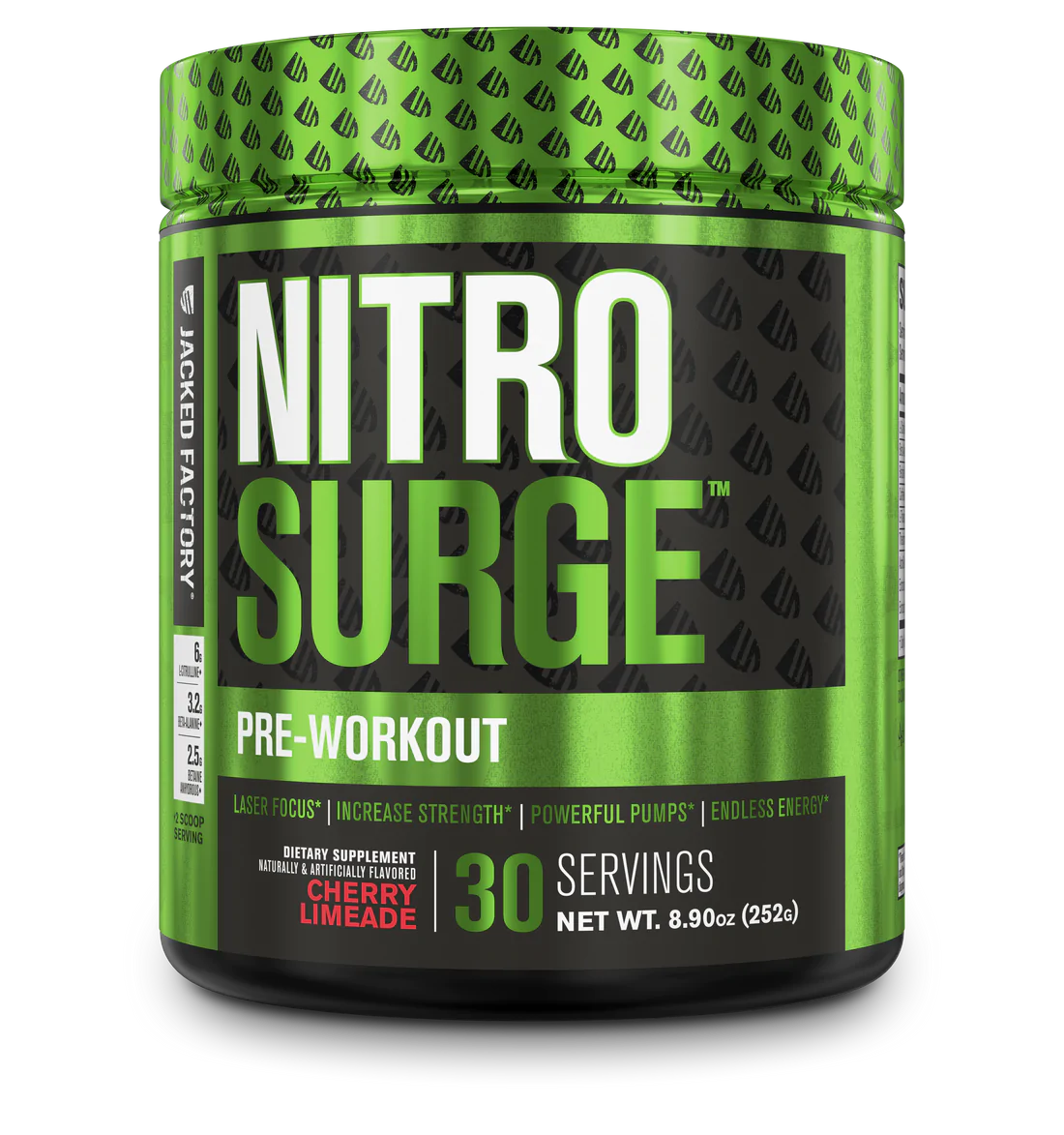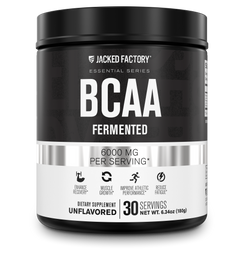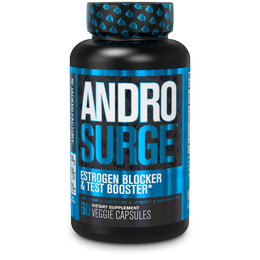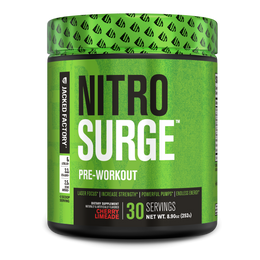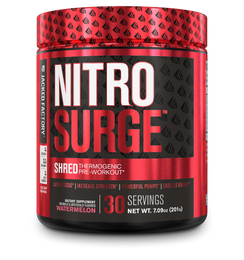Looking to pack on more lean muscle mass? Whether you’re a beginner trainee or an experienced lifter, there are some important concepts you should know that will apply to everyone.
While the actual workout plan a beginner utilizes will generally be different from that of a seasoned lifter, the concepts of building muscle naturally won’t change.
The Goal of This Natural Bodybuilding Guide
This guide will ensure that you know precisely what it takes to pack on pounds of lean muscle and put a game plan into action.
Primary factors for building natural muscle
To build natural muscle successfully, you need to take into account three primary factors:
- Training
- Nutrition
- Supplementation
Miss any one of these elements, and you’ll be seeing less than maximal results. Let’s walk through each of these factors so you can fully understand the requirements for each.
Natural Bodybuilding Training
When looking at your muscle anatomy, you will find three types of muscles: type 1, type 2a, and type 2b. Type 1 muscles are the endurance based muscle fibers that are resistant to growth, produce a low power output, and tend to resist fatigue.
These are not the primary muscles we are concerned with on a natural bodybuilding program. Instead, we are looking more closely at the type 2a and type 2b muscle fibers, which have a higher potential for growth and power output. This is precisely what you are trying to accomplish. These muscle fibers fatigue far faster however, which is why weightlifting sets don’t last for minutes at a time.
With ongoing weight training, you will not only experience a shift in fiber type often, but you can also train so that you build more of a particular type of muscle fiber. So with ongoing bodybuilding training, you can possess more total type 2 muscle fibers, giving you that strong and large look you’re going for.

As you train your muscles, you will also notice two main forms of hypertrophy (an increase in the size of your muscles).
Sarcoplasmic hypertrophy is a temporary size increase due to a higher amount of sarcoplasm in the muscle tissue. This occurs when you get a large buildup of byproducts after a weight lifting workout and have an increased flow of blood into that particular muscle tissue. Basically, it’s your ‘muscle pump.’ You see this size gain quickly upon exercise, but it also tends to leave just about as quickly as it came. This type of growth is mostly noted after lighter weight sets taken into the 10-15 range.
Myofibrillar hypertrophy, on the other hand, is an actual increase in the size of the muscle contractile fibers. This is more permanent and will indicate real muscle size gains. It’s slower to come about, but when it does, it’s more likely to stand the test of time. This type of growth is noted more after heavy weight sets of between 4-10 reps.
Given all of this information, we can now use it to help develop a proper natural bodybuilding program.
What causes muscle growth
To get the muscle growth you want, you’ll need to subject it to a stress load that it has not handled before. This is referred to as progressive tension overload. There are multiple ways you can accomplish this. Some include:
- Performing more reps in any given set
- Adding more weight to the bar
- Decreasing the rest time between working sets
All of these will create muscle damage in the cells, which your body will then repair and grow back stronger and larger if proper nutrition is in place (more on that shortly).
When it comes to building lean, dense muscle, adding more weight to the bar tends to be the best route to take as this will most favor myofibrillar hypertrophy as mentioned above.
This isn’t to say there isn’t a place for the higher rep (sarcoplasmic hypertrophy) sets, but they should not be the main focus of a natural bodybuilding program.
Choosing smart exercises to build more muscle
Another important element in the natural muscle building equation is selecting the right exercises to perform. The two primary choices of exercise include compound and isolation exercises.
Compound exercises are those that work on multiple muscle groups at once, spanning across one or more joints. Squats, bench press, rows, shoulder press, and pull-ups are great examples of these. Because you will have more muscle fibers working with each rep you perform, you have more total power behind you.
What does this mean? More weight lifted. As noted in the above section, this is key to myofibrillar growth. Therefore, compound exercises should make the bulk of your workout program.
Isolation exercises, on the other hand, are those that will ‘isolate’ a single muscle group. As you will be working just one muscle total here, this means less weight lifted. These are perfect then for inducing sarcoplasmic hypertrophy.
So in a good bodybuilding program, you want to the majority of your workout targeted towards compound lifts in the lower rep range that use heavy weights. This will result in a permanent growth of the muscle fibers while also helping you see great strength gains.
In addition to that, a smaller component of your program should be directed towards isolation exercises, using lighter weights and taken into the higher rep range. This will help to shuttle blood into the muscle tissue, resulting in a strong pump and great sarcoplasmic hypotrophy.
In addition to this, these exercises can also help to strengthen individual muscle groups, which may currently be weaker. Strengthening them can then mean you are stronger on your main core lifts, which provides even further myofibrillar growth benefits.
Remember to add sufficient rest time between each set to allow for a near full recovery. This typically means around 120 seconds for compound exercises and 30-60 seconds for isolation moves.
Here is what a sample program may look like:
Natural Bodybuilding Sample Workout Routine
Upper body workout
- Bench Press: 4 sets of 5 reps
- Rows: 4 sets of 5 reps
- Shoulder Press: 3 sets of 5 reps
- Pull-Ups/Downs: 3 sets of 6-8 reps
- Bicep Curls: 2 sets of 10 reps
- Tricep Extensions: 2 sets of 10 reps
- Lateral Raises: 2 sets of 12 reps
Lower body workout
- Squats: 5 sets of 3-5 reps
- Leg Press: 3 sets of 6 reps
- Lunges: 2 sets of 8 reps
- Leg Extension: 2 sets of 12 reps
- Hamstring Curl: 2 sets of 12 reps
- Calf Raises: 3 sets of 15 reps
- Hanging Leg Raises: 2 sets of 15 reps
Remember that you should always try and do more with each workout you do. This indicates progress. As often as possible, add more weight to the bar. However, if you can’t do that (as you will not increase weight every session), add another rep, do another set, or change your exercises around slightly. Just do something to challenge your body in a new manner each and every workout so that you give the body a reason to adapt and grow stronger and larger.
Now that we’ve covered the workout side of things let’s talk about nutrition.
Natural Bodybuilding Diet: Eating For Size

When it comes to building muscle, exercise is really only half the game. In fact, diet can easily make or break your progress.
Think of it this way: if you were to build an addition to your house and you hired a crew of 10 men and gave them all the hammers and nails they needed (but no wood), how far would they get?
Not far at all. They might swing those hammers around all day long, but the new addition to your house would never be built.
In order to build it, they need raw materials. Food is the raw materials for your body. Without it, you will never build more muscle than you have right now.
To see muscle mass gain, you need four things:
- A Calorie Surplus: You must be taking in more calories than you burn off over the course of the day.
- Sufficient Lean Protein: Protein will provide the building blocks that muscle tissue is made of.
- Sufficient Carbohydrates: Carbohydrates provide the energy the body uses to assemble those building blocks (protein) into muscle tissue.
- Sufficient Dietary Fats: These also provide energy, but more importantly, help normalize key hormones (such as testosterone) that are essential for directing the muscle building process.
How many of these do you need?
Take your calorie surplus to about 250-500 calories over and beyond your daily maintenance requirements. This will generally have you gaining about 0.5-1 pound per week. Note that eating more than this doesn’t mean more muscle. It’ll just mean a higher chance of excess fat gain.
To build muscle effectively, 0.8-1.2 grams of protein/lb of body weight should be consumed. Consuming 0.2-0.25 grams/lb immediately post workout can also give additional benefit in helping promote faster recovery, strength gains, and muscle size gains.
And finally, carbohydrates and fats can fluctuate based on your own personal preferences. However, most people will find they feel best on 100 grams of carbs or higher per day and no fewer than 0.35 grams of fat/lb per day. On most natural bodybuilding programs, your intake of both of these nutrients will be higher than these numbers.
Once you have your numbers down, you then need to consider your food choices. Some people adopt an ‘If It Fits Your Macro’s Approach’, meaning they eat anything they desire as long as they hit their numbers for the day.
Others adopt a ‘clean eating’ style, meaning they only eat foods that are natural and unprocessed.
Both of these methods can deliver results but keep in mind eating clean, healthy foods will increase the probability that you build lean muscle mass, stay healthy, stay nourished, and feel energized throughout the day. For most athletes, it’s simply the superior route to go.
This doesn’t mean you can’t indulge occasionally, but keep it to a minimum amount for best results.
In terms of meal frequency, feel free to divide your meals up as you choose, eating anywhere from 3-6+ meals per day. Just do be sure that you eat a good breakfast and get some protein and carbohydrates into your body as shortly after the workout as possible. These are the two periods when eating is a must for optimal results. In addition to that, eating within the 2 hours prior to exercise will also help ensure that you have the energy available to complete that exercise session.
Beyond that, it’s more important to time your meals and frequency in a manner that works with your lifestyle.
Natural Bodybuilding Supplements

Finally, the last thing to take into account is supplementation. With literally thousands of products out there, it’s easy to be misled. You need to put on your detective glasses and choose carefully.
First, make sure any product you consider is free of banned substances. Do your research. The last thing you want to be putting into your body is something that is potentially dangerous or banned (if you plan on competing in a drug-tested organization).
Also, check to see if there are any clinical studies done on the ingredients in the product you are considering. Good products will contain ingredients with research conducted on them, illustrating the results that they produce.
Try and find a product that contains no artificial sweeteners, additives, or dyes. Putting these substances into your system may leave you with unwanted side effects down the road, and they do absolutely nothing to benefit the user.
It’s also important that any supplement you consider list the full ingredient line-up along with the doses it contains. If you notice that the label reads as a ‘proprietary blend’ (meaning the company is not sharing with you precisely what is in the product), step away from that product immediately. You have no idea what you are putting into your body.
Invest in a fully transparent supplement company. They should show you the evidence that their products work, as well as exactly what ingredients the products contain. The Jacked Factory supplement line is a great place to start and meet all of these requirements.
Top 15 Secrets to Success in Natural Bodybuilding
When it comes to natural bodybuilding, training is the part that everyone looks forward to. Understanding how to train a specific muscle group properly with the correct intensity, volume, and other acute variables look easy in comparison to perfecting your meal planner or supplementation guide. This comprehensive list covers the top 15 secrets to success when your goal is to build natural muscle. Use it as a quick reference to keep yourself on track!
1. Eat plenty of protein
Quality proteins are the building blocks of muscle. While individual protein needs will vary from person to person, there is a general guideline for the amount of protein you should be consuming day-to-day. It is recommended, if your goal is growth, to consume at least one gram of protein per pound of bodyweight each day. For the “hardgainer” and more advanced bodybuilder, it may be necessary to ingest up to 2 grams per pound.
In terms of selecting the highest quality proteins, you aren’t going to find anything better than the classic staples: eggs, whey, and meat. Eggs are the perfect bodybuilding food: high in protein and zinc. Eggs are also convenient, inexpensive, and highly bioavailable. They can be prepared in a number of different ways and also offer healthy fats from the yolk.
Whey protein powder is another great way to get a fast serving of quality protein. It’s important to use a high-quality whey that isn’t full of artificial chemicals or carbs. It’s also important to make sure that the whey protein isn’t amino-spiked.
Another option is classic dairy products such as protein from milk, yogurt, and cottage cheese. Milk is a relatively inexpensive way to get in protein, calcium, and vitamin D. However, be aware that milk also contains fat and lactose, which may be a potential downside for some people. For hardgainers or those that need a high amount of calories to gain weight, it may be a perfect option. Cottage cheese is actually the slow digesting casein portion of milk, so it’s no surprise that it is a solid protein source. Yogurt, aside from containing plentiful protein, can also be an excellent source of immune boosting, gut healthy probiotics. Yogurt can also contain sugar and fat depending on the brand, so keep an eye on that!
Finally, meat! While meat, in general, is great for bodybuilding, it is recommended to stick to the cleaner cuts. Local poultry, grass-fed beef, and lean pork are examples of excellent clean complete proteins that can provide your body with all of the essential amino acids it needs.
As a general rule of thumb, try to get in an animal protein with each meal.
2. Don’t neglect carbs
The body’s preferred source of fuel is carbohydrates. You can use protein and fats for energy, but this involves a more complex process within your body.
For the most part, when consuming carbohydrates you will want to focus on complex carbs that are slow digesting. Carbohydrates that are low on the glycemic index (foods such as whole-grain rice, pasta, bread, and oatmeal) are your best options. Simple carbohydrates such as white bread and white potatoes are essentially fast digesting simple sugars. These types of carbs will typically spike your insulin and result in a crash.
Complex carbohydrates digest at a slower rate, which results in a steady rate of nutrients being released into the bloodstream. Most importantly, complex carbohydrates are efficiently utilized.
The general guideline to carbohydrate intake is between 2 to 3 grams per pound of body weight per day. The exception is during a cutting phase where you would reduce your carbohydrate intake to 1 gram per pound of body weight per day. This, of course, may vary greatly depending on the individual.
3. Healthy fats
The last thing you should do if you want to gain serious size is to neglect an entire macronutrient. Despite what you may hear, healthy fats do exist! Foods that are high in healthy fats, particularly monounsaturated fat, are the ideal source for bodybuilders. They play a crucial role in muscle repair and protection. The only fat you should be avoiding is trans fat. Even saturated fats play an important role in your bodybuilding goals.
The king of the healthy fats, omega-3 fatty acids, can be found in fish such as salmon, oils such as flaxseed oil, and seeds such as pumpkin seeds. Here are more examples of fats that you want to include in your diet:
- Avocados
- Olives
- Cashews
- Almonds
- Flax seeds
- Chia seeds
- Olive oil
- Canola oil
4. Don’t forget about your vegetables
When it comes to a bodybuilding diet, the focus is always on animal products and rarely does fresh produce get a moment in the spotlight. Just because you are trying to build muscle doesn’t mean you should skimp on the six to nine servings of vegetables per day.
Vegetables are extremely important as they provide your body with powerful nutrients that will only play a positive role in your results. Fiber, for instance, will ensure proper digestion and nutrient utilization. High protein diets can result in several ailments including kidney stones if fiber intake is too low.
Men should aim to get in 35 to 40 grams of fiber per day, and women should aim for 25 to 30 grams. Ideally, you will reach this number through whole foods, but a fiber supplement may be needed.
5. Drink plenty of water
The importance of water can never be overstated. It is the essential element for overall health, and it plays an important role in helping you grow. Proper hydration ensures a number of amazing benefits, including efficient protein synthesis, proper digestion, and removal of waste products.
Think of water as a transporter. It helps nutrients enter the bloodstream and into the muscle while moving harmful byproducts out of the body.
For those taking supplements, which you more than likely are, water is especially needed. Many fitness supplements like creatine use up a good deal of water and can quickly lead to dehydration. A good rule of thumb for any serious bodybuilder is to drink at least one gallon per day.

6. Make quality protein supplements your friend
Bodybuilders need a level of protein that is much higher than the requirement for your average person. While this can probably be accomplished through whole foods, it’s important to make a quality protein supplement a part of your routine. A protein supplement is a convenient solution that can be utilized as a snack or post-workout meal.
Aim for a high-quality whey isolate that provides you with 20 to 30 grams per serving. This will help you reach your protein goal of one to two grams per pound of body weight per day. The best thing about protein supplements is the rapid digestion and utilization of the amino acids, forcing them directly into the muscle.
A protein supplement isn’t a requirement. However, it makes it easy to get enough daily protein in.
7. Creatine for strength, size, and recovery
Next to protein, creatine is one of the tried and true bodybuilding supplements. Creatine converts into ATP within the body, allowing you to push yourself harder during each workout. It also plays a positive role in the post-workout recovery process. You’ll feel less sore and be able to recover faster. A quality creatine supplement will provide you with 5 grams per serving. Take one serving before and after workouts. Our flagship pre-workout supplement ALTIUS contains a full 3 grams of creatine, as well as our post-workout supplement POWERBUILD.
8. Don’t forget creatine’s buddy, glutamine
Glutamine is an amino acid that plays a big role when it comes to muscle metabolism. Glutamine is responsible for transporting up to 35% of nitrogen into the muscle cell! Nitrogen is essential for muscle building, so its presence in muscle cells is crucial for a bodybuilder.
Glutamine is also known to contain immunity-boosting properties. It encourages proper digestion and provides relief from indigestion and heartburn symptoms. During an intense workout, your glutamine stores will be quickly used up, so it’s important to take before, during, and after your workout. Strive to ingest 5 grams each time you take it.
9. Fill in the gaps with a multi-vitamin
While most of your nutrition will be coming from whole foods, it is important to take a multi-vitamin in order to fill in the gaps. The stress of bodybuilding on the body cannot be overstated. If you are not prepared with the right nutrients, then your body will succumb to overtraining. Be sure to buy a quality multi-vitamin to take with breakfast.
10. Mix your antioxidants
Antioxidants are super nutrients that remove harmful waste products from the body. During a bodybuilding regiment, it’s important to take a variety of antioxidants. Free radicals form as a result of the exercise you’ll be performing, and they have a way of causing havoc on the body.
11. Betaine anhydrous, beta-alanine, and citrulline malate
Getting the most of your training is absolutely key to making gains as fast as possible. These key ingredients have been proven in clinical studies to increase strength, lean body mass, endurance, recovery, pumps, and much more. All three ingredients and more are included as clinically effective dosages in ALTIUS pre-workout.

12. Eat enough food
Put simply: with the extreme nature of your training, your body desperately needs nutrients for basic processes as well as muscle building and recovery. One option is to eat smaller meals more frequently, eating once every 2 to 3 hours. Another option is to eat 3 or 4 big meals per day. Just ensure that you get enough calories to gain mass.
13. Never miss a meal
As mentioned above, the amount of stress that your body is enduring must be met with adequate nutrition. This means that you cannot afford to miss any meals. If you are feeling hungry at any point throughout the day, this is your body’s way of telling you it needs nutrients for energy and recovery. Case in point: you should never get to this point.
14. Cycle between high and low carb days
If you want to keep your body guessing and, in turn, keep your metabolic rate up, then you could alternate your days between ingesting a high and low amount of carbohydrates. Most athletes tend to have their high carb days during the more intense training days (like leg day), alternating between these two phases helps keep an accelerated metabolic rate.
15. Plan ahead
Hands down, the most important tip on this list. Planning ahead ensures success. Life is often chaotic and unpredictable. Regardless of what happens to you throughout the day, the last thing you should be worrying about is your training program, nutrition plan, and meal program.
Protect your muscle gains by preparing meals for the week ahead of time and storing them in glassware. Using a crock-pot to cook 6 pounds of chicken will ensure you have meals set and ready to go. All you have to do is grab it from the fridge.
Same with your supplements: make sure they are pre-packed and ready to go. Buy a vitamin dispenser and fill it with your daily dose of capsule supplements. As for your training program, it goes without saying that you should have at least 8 weeks of exercises planned and written down in a notebook. If you want to guarantee results, you need to get into the habit of planning ahead.
Conclusion
The road to developing a bodybuilding physique, whether for the stage or for your own personal accomplishment, is far from easy. Knowing your way around the weight room is important but don’t forget that nutrition is going to make up 70% of the results you see!
You need to be as comfortable, if not more so, picking up a skillet in the kitchen as you are picking up a dumbbell in the gym. Attaining the physique you want is going to take the right exercise routine, nutritional meal planner, and supplementation program. Stay dedicated and the glory will be yours.
